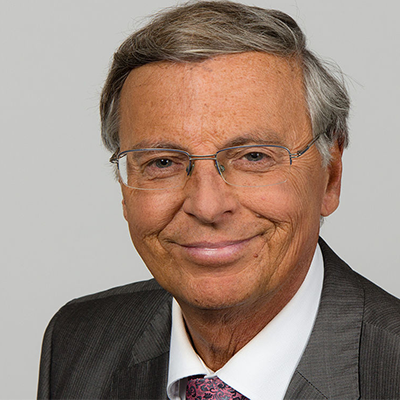From politician to strong brand: Wolfgang Bosbach tells us what’s important
One personality has always stood out from the gray mass of politicians: Wolfgang Bosbach is considered one of the most high-profile and popular German politicians. He was born in Bergisch Gladbach in 1952 and joined the CDU in 1972. After his secondary school leaving certificate, an apprenticeship as a retail salesman and a position as the manager of a supermarket, he took his A-levels on the second educational path and studied law at the University of Cologne, graduating with the 2nd state examination. Since 1991 he has been working as a lawyer in the law firm Winter Rechtsanwälte in Bergisch-Gladbach. From 1994 to 2013, he was directly elected to the German Bundestag in the Rheinisch-Bergisch district without interruption, where he held numerous offices. He did not run again in his constituency in the 2017 federal election.
In the interview with the CDU man, it becomes clear what makes a strong personality brand. The conversation provides valuable impetus for all development seekers – whether politically active or not – who want to do better.

Mr. Bosbach, although you have never held a ministerial office, you are regarded across party lines as one of the most high-profile and popular German politicians. To what do you attribute this personal success?
To decades of political work in very different political offices. First at the local level, then for the last 23 years at the federal level. I was also deputy state chairman of the CDU in North Rhine-Westphalia for some time. And in these almost five decades, the citizens have had the opportunity to get a picture of the politician, but also of the person Wolfgang Bosbach. And the frequent media appearances have certainly helped me become well-known over the years, even without state office.
Transparency
What is particularly important for the external image of a politician? How do you ‘come across’ well?
So, first of all, I have what may be in some people’s eyes an old-fashioned view that it’s difficult to advise a politician on how to give and behave in public because I firmly believe that people have an infallible sense of whether someone is being authentic or whether someone is trying to play a certain role. The decisive factor is the combination of competence and language. Even after 46 years of political work, I still have to read, read, read every day – learn, learn, learn, in other words, learn, and be prepared to keep learning. And perhaps also to correct oneself if one had misjudgments once in the past. In this way, one acquires expertise. However, competence alone will not help you if you are unable to communicate your political beliefs in language that can be understood. Politicians often tend to lecture the public rather than explain why they take what stance.
Authenticity
How firmly definable and tenable is one’s vision as a politician in a business characterized by deals and compromises?
Over the decades, disillusionment sets in. There is the classic phrase: “Politics is about drilling thick boards”. I would add: I had to work my way through whole forests in the course of my political life. If one does not achieve one’s political goal, or does not achieve it at first go, then one should at least make an effort to get a little closer to the goal by way of compromise. Under no circumstances should you run in the opposite direction.
Credibility
Between 2012 and 2016, you were the German politician who participated in the most talk shows, according to your Wikipedia entry. How did you prepare for such political talks? Did you train that or is that just something that is given to you?
Perhaps the good Lord has already given me the talent to formulate a text in such a way that it is actually understood. That people know what is meant. I know many colleagues in politics who formulate things in such a complicated way that you believe you are witnessing a revelation. But in the end it is completely open which position the politician will take now. […] Preparation in the sense that you learn, almost like an actor, a certain role that you then portray on a talk show goes wrong. And the preparation was always a factual preparation, so focused on numbers, dates and facts, depending on the topic. And that in a talk show you make an effort to clearly express why you take which particular political stance. So not only to explain that you are for or against or what you intend to do, but also what the supporting motives are, what the factual arguments are, why you take a certain position.
Clarity
You are regarded as a politician of clear words, which is another reason why you were not always a comfortable deputy for your party leaders. In a position such as yours, how do you manage the balancing act between party presidency and your own convictions if there are ever differences in this respect?
I am in the fortunate position of being able to say that I only represent CDU positions or positions that were once CDU positions. The only thing I could really be accused of is not being able to change my mind fast enough. Whenever controversial debates arose, on issues such as the euro or refugee policy, I could always say that this was once the CDU’s stance on these issues. I still consider this to be correct for the following reasons. Angela Merkel has actually always accepted that, even if we did not agree on these points. And – I think she knows this too – I have never lied to her. I have never cheated on them. I have never made a secret of my opinion. I have never voted secretly other than publicly. She could rely on me. So with me, she always knew where she was at [lacht]. That I was considered a nursing case, yes I believe that immediately [lacht], or as a problem case or as a Quergeist, as the mirror wrote. I believe that immediately. But Angela Merkel would never say he betrayed us.
Reliability
Is a “clear edge” trainable or do you get it in the cradle?
I think that’s where politics meets personality. I couldn’t sleep well if I couldn’t express myself clearly. And I would not be able to conduct the thousands of correspondence that I still have with citizens today if I were not sure of my position. Not “certain” in the sense of infallible, nor “certain” in the sense of “only my opinion is the one I allow to stand”, but “certain” in the sense that I really have formed a well-founded opinion after a thorough process of consideration, which I hold out of conviction, not by chance.
Posture
Mr. Bosbach, thank you very much for this very interesting interview.
The interview with Wolfgang Bosbach was conducted by Prof. Holger J. Schmidt.
Strong personality brand: What matters?
Identity development as a key
The strong personal brand is the pointed expression of what makes a person unmistakable. The development of one’s own distinctive identity makes this distinctiveness tangible. Only if we know our own identity, we can also explain it to others.
Our process for developing identity in individuals is based on a unique matching of self-image and external image. In this way, we avoid building the identity as a wishful image. Strong personality brands are based on a strong external image. This makes them sustainably credible and perceived as authentic.
The benefit of strong personality brands
Such a polished profile leads to a more self-confident appearance, more focused action and, as a consequence, more success. A strong personality brand develops from its inner compass. It does not imitate, but unfolds its own distinctiveness and has model character.
Identity development exposes one’s inner drive and makes visible where I can make a difference. And it answers the question of what I want to achieve and leave behind in life.
Strong personality brands always convey transparency, authenticity, credibility, clarity, reliability and attitude. Developing and discovering one’s own identity and thus becoming a personal brand is valuable for anyone who can and wants to make a difference with their personality – whether a politician, consultant, salesperson or entrepreneur.
Developing one’s own distinctive identity into a clear profile is the key for all development seekers who want to do better.
The detailed interview with Wolfgang Bosbach can be found in the book “Personal Branding – What makes people strong brands” by Christopher Spall.
Credits: Sven Teschke/WikiMedia Commons
Deeper insights into the book “Personal Branding”.

Immerse yourself in Personal Branding

MarkenPraxis Blog
Combining several cultures in one Brand Identity
Developing and establishing a unifying DNA is a complex challenge, especially in globally active organizations. In this article, we show how different cultures can be brought together under one brand, by using the example of our client hep.
How we fight climate change with re-signing and clear sustainability positioning
How can we create conscientious innovation that helps slow down climate change? This was the question Christopher Spall discussed with Medinge Group during Innovation Week in Oslo.
ID Summer Camp: How trailblazing ideas and solidarity grow in nature
Growing companies need a shared identity as a clear compass. That’s why we and our long-term client EIZO Technologies went to our ID Summer Camp on Ammersee for three days.



